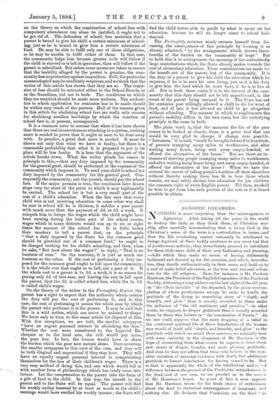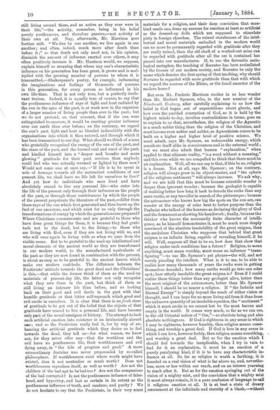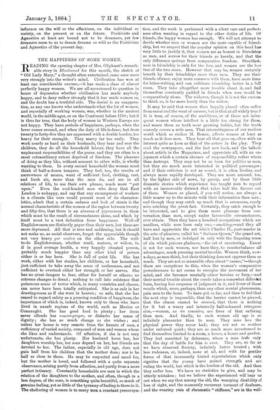AGNOSTIC DREAMERS.
NOTHING is more surprising than the extravagances of Agnostics. After taking all the pains in the world to destroy the idols, as they think them, of Christian wor- ship, after carefully demonstrating that a living God in the Christian's sense of the term is a contradiction in terms, and that the life everlasting cannot rationally be attributed to beings deprived of their bodily existence in any sense but that of posthumous activity, they immediately proceed to substitute for these idols mere dolls of their own fashioning and dressing, —dolls which they make no secret of having deliberately fashioned and dressed up for the occasion, and which, neverthe- less, they dandle enthusiastically in their arms, and hold up to a sort of make-belief adoration, as the true and rational substi- tute for the old religions. Here, for instance, is Mr. Frederic Harrison, the President of the English Committee of the Positivist Society, delivering a long address on the last night of the old year, on " the Choir invisible of the departed, by the pious contem- plation of whose posthumous energy he seeks to kindle the gratitude of the living to something more of "depth, and breadth, and glow than is usually accorded to them under the influence of " the old sentiment and practice,"—in other words, we suppose, to deeper gratitude than is usually accorded them by those who believe in " the communion of Saints." As no one could suppose that the mere dropping of a belief in the continued spiritual life of these benefactors of the human race would of itself add " depth, and breadth, and glow " to the gratitude with which we recall their services, we naturally tarn with some curiosity to the eloquence of Mr. Harrison, in the hope of discovering from what source he expects to draw these new stores of deeper, broader, and more glowing gratitude. And even be does not affirm that those who believe in the com- plete cessation of personal existence with death, feel additional gratitude to former benefactors for having ceased to be. But as that is apparently the whole of the intellectual and m r it difference between the ground of the Positivists' attitude towa,..11 the dead, and of our own, we are puzzled as to the source of Mr. Harrison's hopes. In point of fact it soon appears that Mr. Harrison trusts for his fresh stores of enthusiasm about the dead to rhetorical extravagances of language, and nothing else. He declares that Positivists see the dead " as still living around them, and as active as they ever were in their life,"—the activity, remember, being in his belief purely posthumous, and therefore passive,—not activity of their own at all. Nay, afterwards, Mr. Harrison goes further still. " We live by one another, we live again in one another; and often, indeed, much more after death than before it ;" so that death not only need not, in his opinion, diminish the amount of influence exerted over others, it may often positively increase it. Mr. Harrison would, we suppose, explain himself as meaning that where any one's characteristic influence on his generation has been great, it grows and is mul- tiplied with the growing number of persons to whom it is transmitted,—Shakespeare's poetry, for example, influencing the imaginations and feelings of thousands of persons in this generation, for every person so influenced in his own life-time. That is not only true, but a perfectly irrele- vant truism. Indeed, it is equally tree of course, to say that the posthumous influence of rays of light and heat radiated by the sun in the ages of the past, is at work now in the organism of a larger number of living people than ever in the past; but we do not pretend, on that account, that if the sun were extinguished to-morrow, it would be exerting greater influence over our earth than ever before ; on the contrary, we regard the sun's past light and heat as blended indissolubly with the organisations into which it then entered, and through which it has been transmitted to our day. IN hat should we think of a man who gratefully recognised the energy of the sun of the past, and the stars of the past, and the burned coal and wood of the paste and kindled himself into a " deeper and broader and more glowing" gratitude for their past services than anybody could feel who was actually warmed or lighted by them now ? Would not some one at once say,—` If life is to be spent in acts of homage towards all the antecedent conditions of our present life, we shall have no life left for ourselves to live ?' And yet how do individuals who once lived and have absolutely ceased to live any personal life—who enter into the life of the present only through their influence on the people of the past, or through those contrivances by which the people of the present perpetuate the literature of the past,—differ from those rays of the sun which first generated and then burnt up the fuel of our ancestors, and which exist for us only through the transformations of energy by which the generations are prepared? Where Christians commemorate and are grateful to those who have done great things for them, it is because they feel grati- tude not to the dead, but to the living,—to those who are living with God, even if they are not living with us, and who will once again be living with us when we pass from the visible scene. But to be grateful to the used-up intellectual and moral elements of the ancient world as they are transformed in our modern world, to the manufactured equivalents of the past as they are now found in combination with the present, is about as easy as to be grateful to the ancient forests which make our modern coal-beds. The difference between the Positivists' attitude towards the great dead and the Christians' is this,—that while the former think of them as the used-up materials of present-day life, the latter not only recognise what they owe them in the past, but think of them as still living an intenser life than before, and as looking back on their good and evil deeds in the past with that humble gratitude or that bitter self-reproach which good and evil excite in ourselves. It is clear that there is no fresh store of gratitude to be got out of the belief that the objects of that gratitude have ceased to live a personal life, and have become only part of the moral amalgam of history. The attempt to lash such artificial emotion into existence is an intrinsically absurd one; and so the Positivists really feel it, for by way of en- hancing the artificial gratitude which they desire us to feel towards the dead, they tell us—for what reason, we know not, for they never offer any—that the worthless and the evil have no posthumous life, their worthlessness and evil dying away, in " the tide of progress and good." A more extraordinary doctrine was never propounded by so-called philosophers. If worthlessness exist where worth might have existed, does it not neutralise so much worth ? Does not worthlessness reproduce itself, as well as worth ? Are not the children of- the bad apt to be bad too ? Are not the companions of the bad corrupted ? Is not the posthumous influence of false- hood, and hypocrisy, and lust as certain in its extent as the posthumous influence of truth, and candour, and purity ? We do not hesitate to say that the Positivists, in their very scant
materials for a .religion, and their deep conviction that man- kind needs one, dress up excuses for emotion at least as artificial as the dressed-up dolls which are supposed to stimulate piety in foreign churches. The ruined storehouses of the intel- lectual and moral materials embodied in the modern world can no more be permanently regarded with gratitude after they are really ruined, than the old shaft of a worked-out mine can be regarded with gratitude after all the ore it contained has passed into our manufactures. If, to use the favourite socio- logical metaphor, the teaching of Socrates has been assimilated by the tissues of our modern society, and Socrates be only the name which denotes the first spring of that teaching, why should Socrates be regarded with more gratitude than that with which we regard the sources of the Rhine, or the fossil ancestor of the modern horse?
But even Mr. Frederic Harrison excites in us less wonder than Mr. Herbert Spencer, who, in the new number of the Nineteenth Century, after carefully explaining to us how the belief in God began , out of superstitions about ghosts, and how even the purified conception of God, as it is held by the highest minds to-day, involves contradictions in terms, goes on to explain to us that, nevertheless, the religion of the Agnostic is a much nobler thing than the religion of the Christian, and must become even nobler and nobler, as Agnosticism comes to be built on a higher and higher level of positive science. We must admit, says Mr. Spencer, an unknowable energy, which manifests itself alike in consciousness and in the external world ; but we must also admit that human " explanation," when applied to that ultimate reality, " is a word without a meaning," and this even while we are compelled to think that there must be an explanation. Well, all we can say is that, if this be so, religion is a dream. Not at all, says Mr. Spencer ; on the contrary, religion will always grow in its object-matter, and "the sphere of the religious sentiment" will always increase. We ask why, and we are told that this must be because scientific wonder is deeper than ignorant wonder ; because the geologist is capable of realising better how long it took to denude the rocks than any mere rustic, or any traveller in search of the picturesque ; because the astronomer who knows how big the spots on the sun are, can wonder at the energy of solar heat to better purpose than the Psalmist who talked of the heavens as declaring the glory of God. and the firmament as showing his handiwork ; finally, because the thinker who knows the necessarily finite character of intelli- gence, as he himself demonstrates it, must be much more deeply convinced of the absolute insolubility of the great enigma, than the credulous Christian who supposes that behind that great enigma is an infinite Being, capable of revealing himself, if he will. Well, suppose all that to be so, how does that show that religion under such conditions has a future ? Religion, to mean anything, must mean worship, must mean an influence "trans- figuring "—to use Mr. Spencer's pet phrase—the will, and not merely puzzling the intellect. What is it to me, to be able to realise how many thousands of years the rocks were in getting themselves denuded ; how many earths would go into one solar spot; how utterly insoluble the great enigma is Even if I oonld realise these things better than any geologist alive, better than the most original of the astronomers, better than Mr. Spencer himself, I should be no nearer a religion. If "the Infinite and Eternal Energy" is simply beyond the reach of either vision or thought, and I can hope for no more living aid from it than from the unknown quantity of an insoluble equation, the " sentiment" which it must excite in me cannot but be the most barren and empty in the world. It comes very much, so far as we can see, to the old Oriental notion of " Om,"—as absolute being and also absolute nothingness. If God is righteous in any sense in which I may be righteous, however humbly, then religion means some- thing, and worship a great deal. If God is love in any sense in which I can love, however feebly, then religion means something, - and worship a great deal. But as for the emotion which I should feel towards the inexplicable, when I try in vain to find for it an explanation, it must be an emotion of a purely paralysing kind, if it is to have any characteristic in- fluence at all. So far as religion is worth a farthing, it is founded on a real vision of what is far above us, and, neverthe- less, more or less within our reach, and on an intense yearning to reach after it. But as for the emotion springing out of the vision of a mighty mist, and the conviction that a mighty mist it must always remain, it is a pure confusion of language to call it religions emotion at all. It is at best a state of dreary amazement at the infinitude and eternity of a blank,—without
influence on the will or the affections, on the individual or society, on the present or on the future. Positivists and Agnostics at least are bound not to be dreamers, yet few dreamers seem to us to dream dreams so wild as the Positivists and Agnostics of the present day.








































 Previous page
Previous page